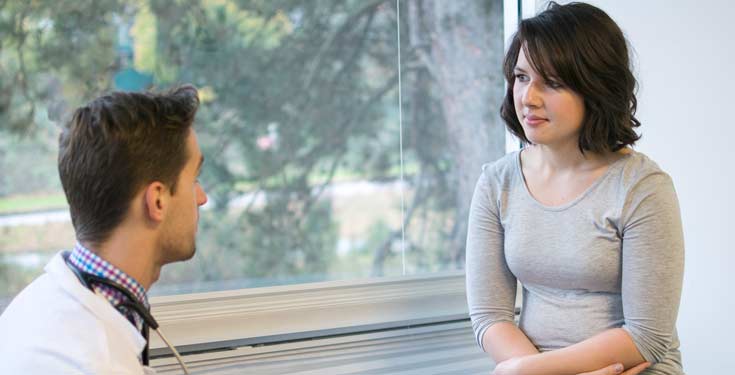NUNM students have many opportunities to explore topics, research and areas of practice that interest them. From broad elective choices to research study participation and self study, our students choose the doctor they want to become. Rachel Peterson, naturopathic doctoral student, shares her research and perspectives on addressing chronic inflammation.

Chronic inflammatory diseases are the number one cause of death worldwide.[2] Stroke, chronic respiratory disease, heart disorder, cancer, obesity, and diabetes all have roots in chronic inflammation.[1] The World Health Organization (WHO) predicts that diseases associated with chronic inflammation will increase continuously over the next thirty years.[1]
Not All Inflammation is Destructive
Contrary to popular belief, inflammation is the body’s crucial healing process, involved in everything from wounds to infections. In a balanced individual, inflammation acts as a chemical protection system. When a foreign invader such as a virus enters the body, lymphocytes (immune cells) are alerted.[1] These lymphocytes secrete chemicals, called cytokines, that attract additional cells to aid in the destruction of the threat. In this way, acute inflammation is crucial to a healthy, balanced body.[2]
As a healing process, inflammation becomes destructive when it does not stop. Disease stems from chronic, not acute, inflammation. When uncontrolled, inflammatory cytokines damage not only foreign invaders, but also an individual’s own cells, disturbing the natural balance of hormones and causing premature aging.[1] Chronic inflammation damages gut health, mental health, and egg quality in women.[2]
Many women with chronic inflammation struggle with weight gain and insulin resistance due to a phenomenon called lipotoxicity, where fat tissue is directly affected by this destructive cellular environment.[2] The body stores excess energy in fat cells, but when these cells are full, the free fatty acids have nowhere to go and they are released into the bloodstream.[2] This free fat can damage organs and cause fat necrosis, when fat cells die off due to poor blood supply. To mitigate cell death, the lymphocytes constantly release cytokines to clear out the dead fat tissue.[2] This makes for a vicious cycle, in which toxic fatty acids accumulate and lead to more inflammation, and vice versa. The lipotoxic tissue also promotes insulin resistance in conditions like rheumatoid arthritis and PCOS, putting these individuals at greater risk for type 2 diabetes.[2]
Leaky Gut is Major Source of Chronic Inflammation
In addition to toxic fat, increased intestinal permeability (leaky gut) is another major source of chronic inflammation. Lymphocytes line the small intestine, forming a direct connection between the immune system and the gut.[2] Problems arise when the small intestinal barrier breaks, allowing undigested food to leak into the bloodstream.[3] The lymphocytes respond by triggering systemic inflammatory processes.[2] Symptoms of leaky gut include indigestion, bloating, indigestion, constipation, food sensitivities, and skin inflammation.[3]
In addition to gastrointestinal complications, individuals with chronic inflammation often experience body pain, frequent infections, weight gain, constant fatigue, insomnia, depression, anxiety, and mood disorders. Testing for high sensitivity C-reactive protein (hs-CRP) and erythrocyte sedimentation rate (ESR) can provide quantitative data about systemic inflammation. The hs-CRP levels indicate the degree of systemic inflammation and can also indicate risk for cardiovascular disease.[2] ESR is associated more often with autoimmune disease inflammation.[2]
Natural Options for Treatment
The good news is, there are many natural options available for treating chronic inflammation and lessening the symptoms of associated conditions. Healing the gut minimizes a major source of inflammation. Eating an anti-inflammatory diet and practicing insulin counting can be extremely helpful. Studies show that gluten creates pores in the intestinal cell wall, allowing leaky gut to occur, so many people find that removing gluten alone makes a huge difference.[4] Other food allergies can also cause leaky gut. Common allergens include dairy, wheat, corn and soy. Food allergy testing or experimenting with an elimination diet can be utilized to pinpoint the specific aggravating foods. Digestive health can also be supported by probiotics, digestive enzymes, L-glutamine, N-acetyl glucosamine, and zinc.[2]
Supplements can be used to target systemic inflammation, by reducing the amount of cytokine markers or inflammatory chemical signals. Resveratrol minimizes cytokine secretions.2 Omega-3 fatty acids, found in fish and flaxseed oil, contain eicosapentaenoic acid, a powerful anti-inflammatory compound.[2] Bioflavonoids are some of nature’s most abundant anti-inflammatory molecules. They can be supplemented with grape seed and pine bark extract, or simply by eating dark berries and drinking green tea.[1] Studies show bioflavonoids increase the regulatory lymphocytes that control overactive inflammatory responses. Systemic enzymes, extracted from pineapple and papayas, should be taken on an empty stomach for anti-inflammatory benefits. Glutathione and n-acetyl cysteine quench damaging free radicals and act as master antioxidants to counteract the cellular damage of inflammation. Studies also show N-acetyl cysteine lessens insulin resistance and improves ovulation and female hormonal balance, so it is a great option for hormonally related inflammation.[2] Curcumin extract and Vitamin D are also prominent anti-inflammatory molecules.[1]
Usually associated with other conditions, chronic inflammation is a complex process that can be difficult to discern and problematic to treat. With knowledge on the cellular basis of chronic inflammation, how to test for it, and options of treatments, we can begin an exploration of viable treatments. Chronic inflammation is a powerful reminder of how important it is to treat the root cause of imbalance, to experience lasting and profound improvements in health.
References
- Pahwa R, Jialal I. Chronic Inflammation. StatPearls. October 2018. https://www.ncbi.nlm.nih.gov/books/NBK493173/. Accessed January 2, 2019.[1]
- McCulloch F. 8 Steps to Reverse Your PCOS: a Proven Program to Reset Your Hormones, Repair Your Metabolism and Restore Your Fertility. Austin, TX: Greenleaf Book Group Press; 2016.[2]
- Bell B. Is Leaky Gut Syndrome a Real Condition? An Unbiased Look. Healthline. https://www.healthline.com/nutrition/is-leaky-gut-real.Published February 2, 2017. Accessed January 2, 2019.[3]
- Does Gluten Cause Leaky Gut Syndrome? Healthline. https://www.healthline.com/nutrition/gluten-leaky-gut. Accessed January 2, 2019.[4]
More Articles on Women’s Health
Interested in learning about women’s health and natural medicine? NUNM has several programs to choose from including a naturopathic doctorate, doctorate of Chinese medicine, masters in nutrition and more. Sign up and request more information to learn more about your options.